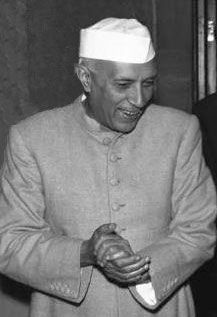The 64-year-old Planning Commission, a vestige of the socialist era, will soon become history.
Prime Minister Narendra Modi, in his Independence Day speech, on Friday announced that the Commission, set up in 1950 at a time when government gave public sector the commanding heights of economy, would be abolished and replaced with a more relevant institution.
 Greatly impressed by the Soviet planning system, the country's first Prime Minister Jawaharlal Nehru had set up the Planning Commission to steer the nation's economic destiny.
Greatly impressed by the Soviet planning system, the country's first Prime Minister Jawaharlal Nehru had set up the Planning Commission to steer the nation's economic destiny.
Set up by a Cabinet Resolution, the Commission enjoyed immense power and prestige as it had always been headed by the Prime Minister. Its most important function was to fix targets for sectoral growth and allocate resources to achieve them.
The Deputy Chairman of the Commission has often been a political stalwart holding the rank of a Cabinet Minister. The stalwarts who had been the deputy chief of the panel included Gulzarilal Nanda, V T Krishnamachari, C Subramaniam, P N Haksar, Manmohan Singh, Pranab Mukherjee, K C Pant, Jaswant Singh, Madhu Dandavate, Mohan Dharia and R K Hegde. The last deputy chairman was Montek Singh Ahluwalia.
The Soviet-era style planning body, however, lost its relevance after the opening of the economy in the 90s. With the dismantling of the licence raj, it functioned only as an advisory body without any effective power.
"We will very soon set up a new institution in place of Planning Commission...the internal situation of the country has changed, global environment has changed...We need an institution of creative thinking and for optimum utilisation of youth capability," Modi said in his Independence Day address.
The Commission was set up by Nehru with the explicit objective to promote a rapid rise in the standard of living of the people by efficient exploitation of the resources of the country, increasing production and offering opportunities to all for employment in the service of the community.
It was charged with the responsibility of making assessment of all resources of the country, augmenting deficient resources, formulating plans for the most effective and balanced utilisation of resources and determining priorities.
The Commission's working in recent years was often criticised by the Chief Ministers who resented being called by Deputy Chairman every year for approval of their state plans.
"We have come to Delhi just to be told by the Commission how we should spend our own money," Tamil Nadu Chief Minister J Jayalalithaa had said in 2012 after a meeting with the then Planning Commission deputy chairman Montek Singh Ahluwalia.
Former Commission member welcome Modi's decision
Welcoming Modi's decision to do away with the plan panel, former Planning Commission member Bimal Jalan said: "It is very good idea. Planning has become outdated concept now. There is a need to modernise it. We have to see the blueprint of the new concept. But change was very much required."
Expressing similar opinion, another former Commission member Abhijit Sen said Modi has cleared the air about the future of the Commission.
"Yesterday there were news about appointment of deputy chairman. It is not still clear what would be the structure of new body. But the Planning Commission will not be the Planning Commission it was," he added.
Describing the Commission a "hangover from the Soviet era" former Cabinet Minister Subramaniam Swamy tweeted, "in 1972 I wrote that Planning Commission needs to be restructured as a Finance Commission."
Industry chamber CII too welcomed the decision and said: "We would be happy to work closely with Government to offer ideas on the outline of a new development and implementation institution."
History of the Commission
India had launched the first Five-year Plan in 1951 and two subsequent five-year plans were formulated till 1965, when there was a break because of the Indo-Pakistan Conflict.
Two successive years of drought, devaluation of the currency, a general rise in prices and erosion of resources disrupted the planning process and after three Annual Plans between 1966 and 1969, the fourth Five-year plan was started in 1969.
The Eighth Plan could not take off in 1990 due to the fast changing political situation at the Centre and the years 1990-91 and 1991-92 were treated as Annual Plans. The Eighth Plan was finally launched in 1992 after the initiation of structural adjustment policies.
For the first eight Plans the emphasis was on a growing public sector with massive investments in basic and heavy industries, but since the launch of the Ninth Plan in 1997, the emphasis on the public sector has become less pronounced and the current thinking on planning in the country, in general, is that it should increasingly be of an indicative nature.
Currently, the 12th Five-year-plan is on and will end in March 2017.









